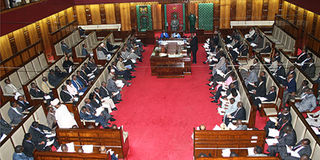MPs pass Bill seeking to trim Cabinet

The Kenyan Parliament in session. The House adopted a joint report that found President Kibaki's reappointment of Justice Ringera as KACC director illegal. Photo/FILE
What you need to know:
- Bill requires ministers to at least possess a basic university degree.
- MPs propose Cabinet should be drawn from outside Parliament for effective checks and balances and better delivery of service.
The Kenya Parliament has overwhelmingly passed a Bill that will limit the number of ministries to a maximum of 24.
If enacted, the Offices of Ministers Bill moved by Turkana Central MP Ekwee Ethuro also requires ministers to at least possess a basic university degree and be vetted before they are appointed.
With the move, MPs have set the stage for President Kibaki and Prime Minister Raila Odinga to act and trim the 42-member Cabinet.
The current Cabinet was constituted after a power sharing government was formed between Kibaki's PNU and Odinga's ODM to end post election violence.
Only Education minister Sam Ongeri opposed the Bill, terming it unconstitutional, while Labour Assistant minister Sospeter Ojaamong said he was confused whether to support it or not as "it is trying to set the country on fire."
Public Service minister Dalmas Otieno, Development of Northern Kenya's Mohamed Elmi, co-Government chief-whip Jakoyo Midiwo and Sports Assistant minister Kabando wa Kabando however joined backbenchers Margaret Kamar, Moses Lessonet, Shakil Shabir and Mutava Musyimi in supporting the bill.
If enacted, the next government will be the one to introduce the leaner Cabinet. However, if President Kibaki assents to the Bill, he could set a new starting date.
The Bill was supported by Internal Security and Provincial Administration Assistant minister Simeon Lesirma on behalf of the government last week.
The Bill seeks to “enhance the autonomy of Parliament in performing its oversight role by protecting it from depletion by the Executive through the appointment of an excessive number of ministers”.
It says: “The principal objective of the Bill is to fulfill the constitutional obligation imposed on Parliament by section 16 of the Constitution which requires Parliament to establish the offices of Minister of the Government of Kenya so as to define the number of ministries necessary for the transaction of the business of government.”
On Wednesday, members described the bloated Cabinet as expensive to maintain, ineffective in the delivery of services and confusing to public as well as ministers themselves.
“I was embarrassed when a minister asked me the name of a colleague who was just seated on the opposite side of the House. This showed even ministers don’t know each other as their number is too big,” Mr Kabando said.
The Mukurweini MP accused President Kibaki and Mr Odinga of being hostages to ethnic and regional interests in Cabinet and that the proposed law will help reduce tribalism and ensure only competent people were appointed.
It is as a result of the huge Cabinet that some permanent secretaries and ministers were fighting over running of their ministries, Mr Kabando said.
Mr Otieno described the proposed law as timely adding that political expediency was about to run down “our” institutions as ministries were created and allocated to satisfy ethnic and political interests.
Mr Elmi said the trimming of ministries will help harmonise functions and benefit all parts of the country.
Mr Lessonet regretted that some departments had been turned into ministries costing the tax-payers huge sums of money.
Prof Kamar said Kenya should emulate Rwanda where ministries were allocated according to qualification.
Mr Shabir, Mr Midiwo and Mr Musyimi said the Cabinet should be drawn from outside Parliament for effective checks and balances and better delivery of service.
Mr Midiwo said drawing ministers from Parliament encouraged tribalism and promoted corruption.
He added that it was a shame that a country which cannot feed its people was maintaining 95 members of the Cabinet.
Mr Ethuro said the Sh350,000 and Sh250,000 each Cabinet minister and his or her assistant earn respectively could be used to build a classroom every month.
Parliament has never made a law on the number of ministries and it has always been left to the president's discretion and in the present coalition government, President Kibaki and Prime Minister Odinga.
The Constitution says: “There shall be such offices of Minister of the Government of Kenya as may be established by Parliament or, subject to any provisions made by Parliament, by the President.”
At least 18 ministries will be chopped or merged if the Bill becomes law while five ministers are likely to be locked out of the Cabinet upon its implementation. Many Kenyans who have served in the Cabinet, some quite successfully, did not have degrees.
Merging the current ministries will reduce government spending on salaries, allowances, security and staff for ministers and permanent secretaries. The Public Health and Medical Services ministries have been cited as an example of some which should be merged as their roles have often clashed and created confusion.
A new giant ministry of Finance, National Planning, Cooperative Development and Regional Authorities will be formed, bringing together four current ministries.
The Labour Ministry will be merged with Immigration while Defence will be joined with Provincial Administration and Internal Security.
Education will be merged with Higher Education to form the Ministry of Education, Science and Technology.




